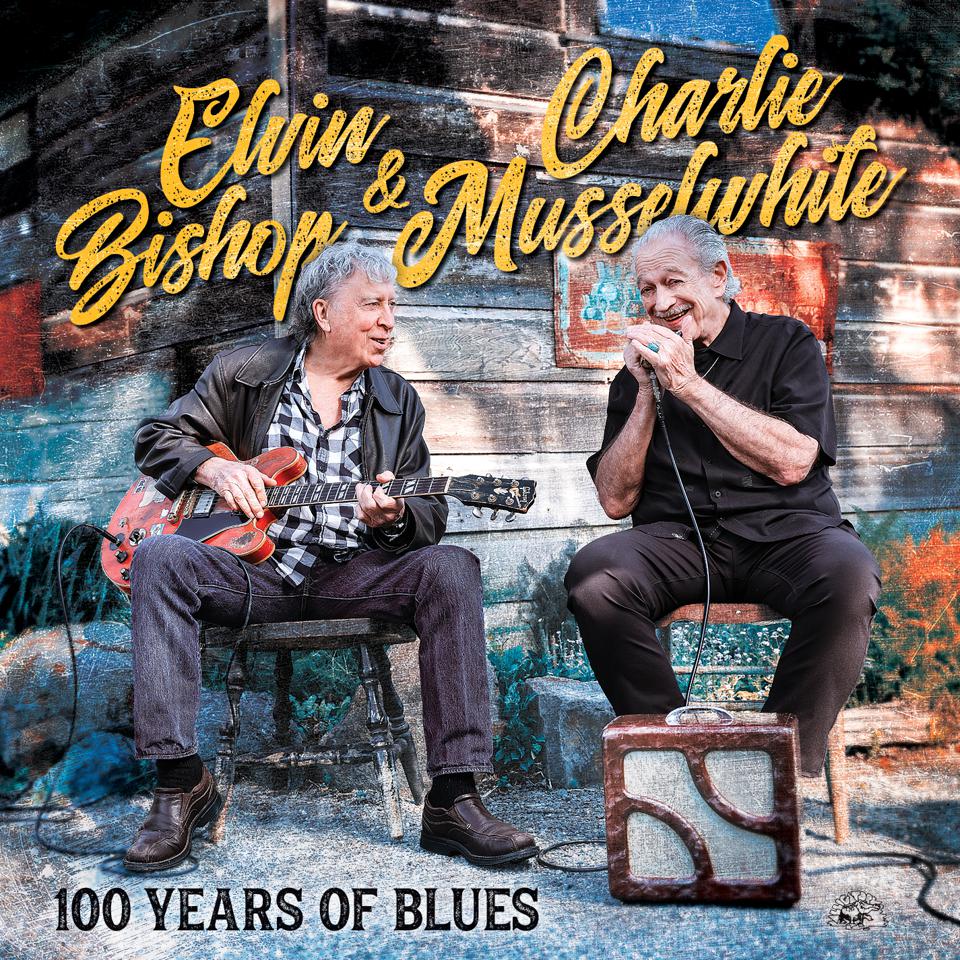
Elvin Bishop and Charlie Musselwhite’s new album cover, “100 Years of Blues.”
Alligator Records
Rock And Roll Hall of Fame guitarist Elvin Bishop and Grammy-winning harmonica master Charlie Musselwhite, among the most famous bluesmen in the world, have just teamed up to make 100 Years Of Blues, a new Alligator album being released tomorrow, Friday, September 25th.
Bishop and Musselwhite are both Blues Hall of Famers with over 100 years of professional musicianship between them. They’ve known each other since the early 60s, but this is the first time they’ve teamed up to make an album. 100 Years Of Blues is front-porch, down-home music on 12 rootsy, spirited, humorous songs including nine originals and three classics. Bishop plays guitar and sings vocals and Musselwhite plays harmonica, slide guitar and sings vocals, Bob Welsh is on guitar and piano, and Kid Andersen plays upright bass.
Both Bishop and Musselwhite got their start in the early 1960s on Chicago’s blues-rich South Side. Bishop, from Oklahoma, was taught by guitarist Little Smokey Smothers. Musselwhite, from Memphis, was mentored by Delta bluesman Big Joe Williams and harmonica master Big Walter Horton. Although Bishop and Musselwhite were young white newcomers, the Black blues fans and established musicians accepted them because they were “from down home” and played the blues with real feeling.
I caught up with each by phone in California: Elvin in Marin County and Charlie in Sonoma.
Charlie, what gave you the idea for this album? Elvin and I have known each other for over 50 years. A couple of years ago, we were on tour with several bands and part of the show was that Elvin and I would sit side by side and do a few numbers together, just like we were sitting on our front porch with no band. It went over so well that we started getting booked as a duo for performing arts centers. We thought, “If we can keep this up, we might as well have a CD to sell to these folks that come to see us.” So we went to the studio at Elvin’s house and sat down and recorded everything live, just like right off the floor.
Elvin Bishop: It was one of the most painless experiences I ever had. It just rolled right out.
Elvin, would you describe the album? It’s like the real old blues that Charlie and I are familiar with. It goes even farther back than Chicago blues to how guys used to do it a long time ago.
Charlie Musselwhite: Well, it’s a couple of guys that love the blues and they’ve loved it all their lives, playing it from their hearts.
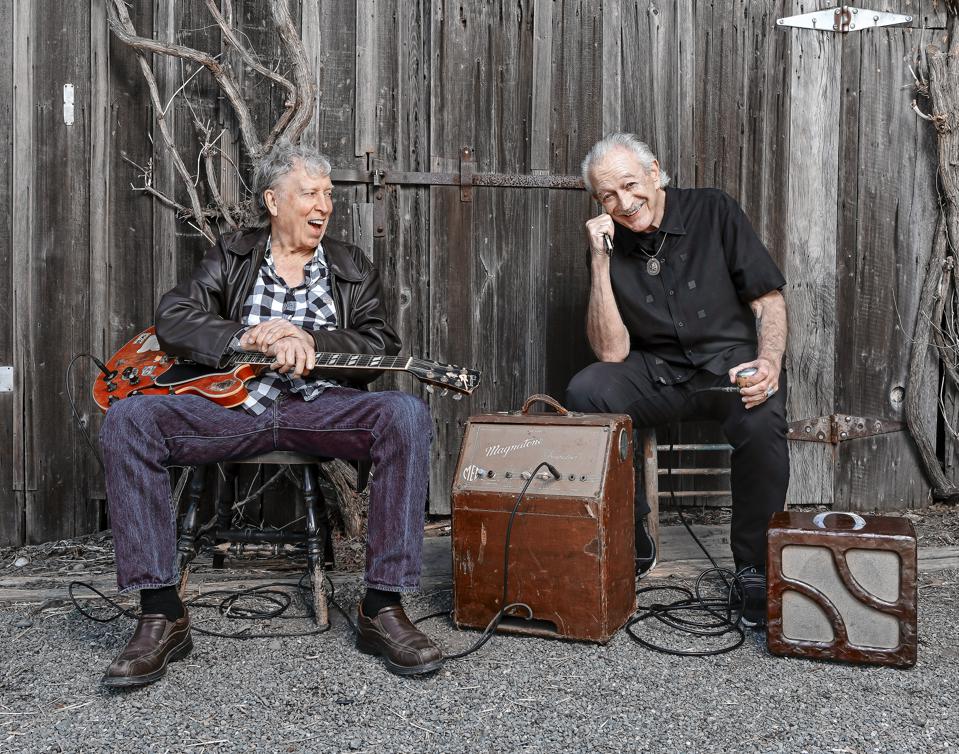
Elvin Bishop and Charlie Musselwhite shar stories in between playing.
© Steve Jennings
How do you think this album compares to all your other albums?
Charlie Musselwhite: I don’t remember where I did just a duo with somebody. It’s just a real personal thing for both of us. We play together so well because we feel the same way about the music. I tell people that even if I’d never had a career in music, I still would be playing it because it’s just something I do. I was just lucky that I was able to have a career in it, and I’m sure Elvin feels pretty much the same way. So we’re kindred souls.
Elvin Bishop: It’s just a different animal. We did almost no overdubs on this thing. And it’s just natural flowing. We didn’t really rehearse much. Charlie just got in there and did a half dozen tunes he wanted to do, and I did half a dozen tunes I wanted to do, and we did our best to back each other up.
Why did you choose Help Me, Midnight Hour Blues, and West Helena Blues as the three classics?
Elvin Bishop: I always liked West Helena. It’s a Roosevelt Sykes song. And I’ve loved Midnight Hour Blues forever. It’s a 1920s song from Leroy Carr. Charlie’s been doing Help Me for a long time. He’s one of the few guys that can actually do Sonny Boy’s tunes. That’s a good thing about Charlie doing these old blues: he opens up his mouth and you believe it.
Charlie Musselwhite I did Help Me on my first album in 1966 in Chicago and always get requests for it, so I keep playing it. I always liked West Helena. James Cotton recorded it, one of his first recordings, and when James and I did a tour together, I was singing for him and I did that tune for him and we both enjoyed doing it. It’s just great blues and it was natural to do it in this setting.
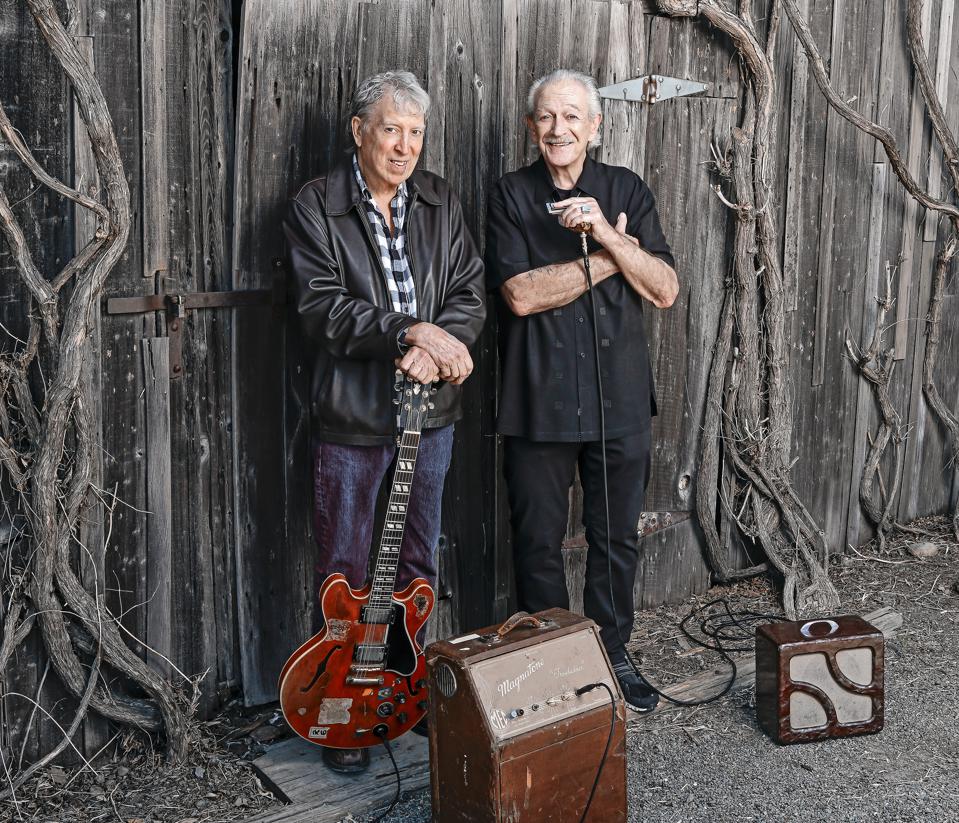
Elvin Bishop and Charlie Musselwhite in rehearsal
© Steve Jennings
Charlie, what’s your favorite song on this album? Oh gosh, it depends on what day you ask me. They’re all really good. One tune in particular, Blues For Yesterday. We were just in the studio recording with the engineer Kid Andersen, and he said, “You know? I sure like that Blues For Yesterday we used to do.” He used to be in my band years ago, and we would do that tune then. He said, “You really ought to do that one.” I had forgotten all about that tune, so I dug it out of my head, which is a scary place to go sometimes. I hate to go there alone.
Elvin what’s your favorite song? I like them all to one degree or another, but my favorite one is Blues for Yesterday that Charlie does. It’s just got a feeling to it. As Charlie’s career has gone along, he hasn’t changed the style of music that he does, but he’s really redefined and honed it down to just getting better and better. Before we started doing gigs together, I called him one day and told him, “I admire what you’re doing, because most guys, when they get to be our age have stopped improving a long time ago and just kind of ride on the past.” Every time you see Charlie, he’s a little better.
Charlie Musselwhite: Elvin truly does love the blues, I mean the real deal blues, and we both had such similar experiences and we just have this camaraderie — like I said, kindred souls. It’s just so refreshing to me to be around somebody that really loves the blues the same way I do.
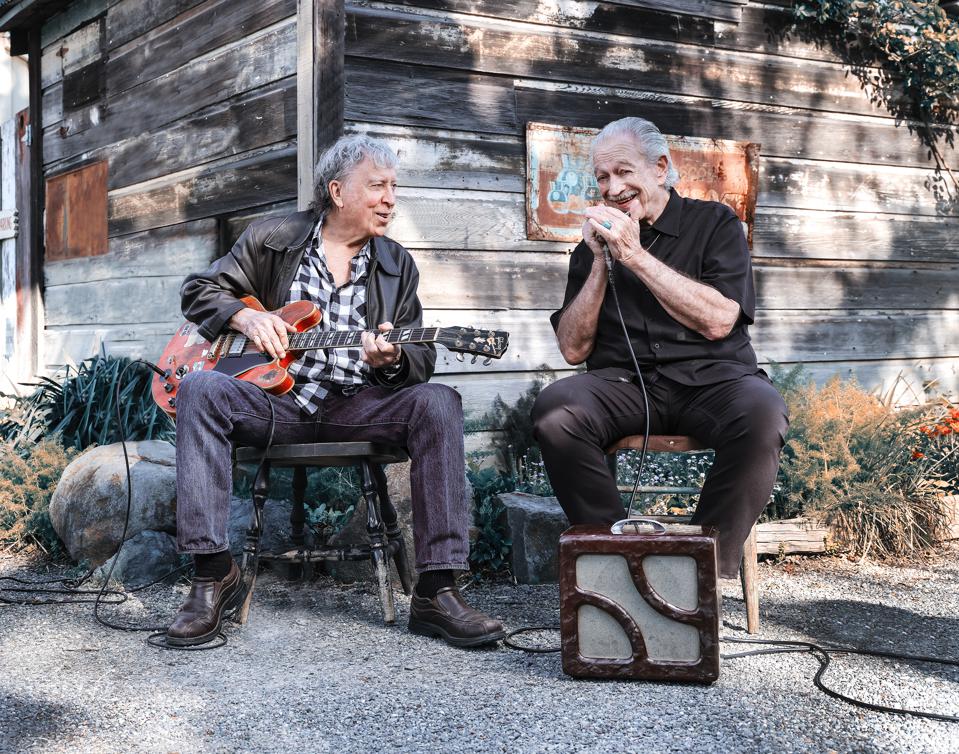
Elvin Bishop and Charlie Musselwhite play some back porch blues
© Steve Jennings
Charie, what do you think is the future of blues? When I first got to Chicago, blues was nothing like today. You could hardly even read anything about blues. And today, you’ve got blues magazines from all around the world, blues societies, blues festivals, blues cruises — none of it existed when I started out. So to me, it’s grown all over the world in a huge way, and I don’t see it going any other way than just keeping on. It seems like any time anybody’s properly exposed to real blues, it’s like, “Oh yeah, I’ve got to hear more of that.” A lot of people don’t really know what blues is, they think it’s something sad. But once they hear the real thing, they’re just hooked, so it spread all around the world at a grassroots level.
Elvin Bishop: When I started, there were maybe 1% white people interested in it. Now you go to a blues concert and there’s maybe 1% black people there. Blues is for people who like to connect up their music with the rest of life a little more. Pop music is mostly just like clothing and hairstyles. It’s a little thing of the moment. Trends come and go, and people skitter along the surface with it. But blues is for people that feel things a little more deeply.
Order your copy of 100 Years of Blues here.
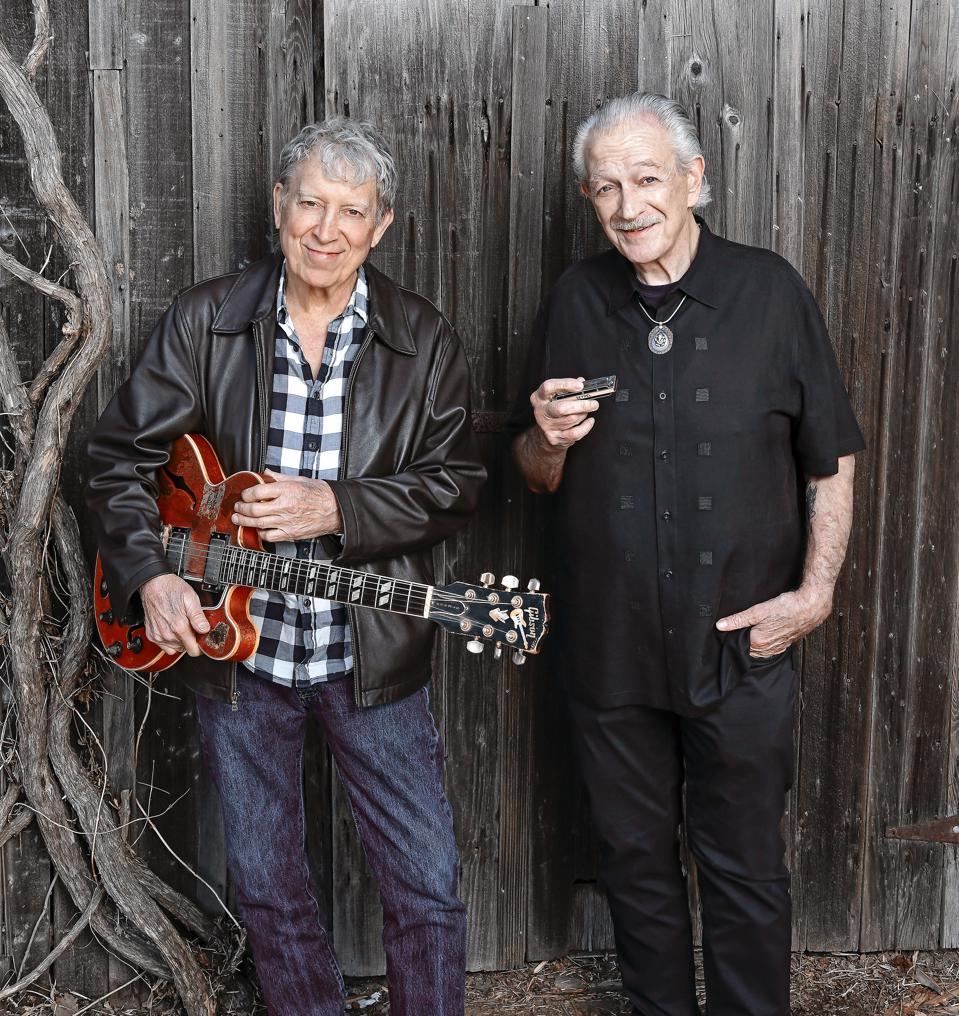
Elvin Bishop and Charlie Musselwhite: two kindred souls
© Steve Jennings